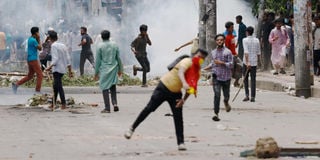Ripple effects of protests on healthcare

Protesters clash with Border Guard Bangladesh (BGB) and the police outside the state-owned Bangladesh Television as violence erupts across the country after anti-quota protests by students, in Dhaka, Bangladesh, July 19, 2024.
A small bottle, a small Kenyan flag, and a cell phone, were the only common tools in their hands. On June 18, 2024, Kenya witnessed widespread demonstrations in response to the Finance Bill 2024, which many citizens viewed as an unbearable financial burden.
These protests, unlike previous ones, were not tied to any specific political movement or party. Instead, they were organised exclusively through social media platforms like Instagram, TikTok, and X (formerly Twitter), marking a new era of digital activism in Africa, reminiscent of Egypt's 2011 and 2019 uprisings. This leaderless, tribe-less movement was driven by a younger generation intent on asserting their sovereign status and reminding the state that power ultimately rests with the people.
While the protests led to significant political outcomes, such as the withdrawal of the Finance Bill, the dismissal of Cabinet secretaries, and the planned bipartisan dialogues, they also came at a high cost. Reports of police brutality, abductions, and even killings emerged, casting a dark shadow over the exercise of constitutional rights, particularly the right to peaceful assembly under Article 37 of the Kenyan Constitution.
Beyond the immediate political and human rights implications, these protests had another, less visible impact — the disruption of healthcare services, particularly in the area of Sexual and Reproductive Health (SRH).
A survey conducted by the Reproductive Health Network Kenya (RHNK) between July 15 and 25, 2024, revealed the extent of this disruption. According to the survey done across over 100 facilities, 69 per cent of healthcare facilities reported closures and decreased client turnout due to safety and security concerns. This significant reduction in operational hours severely limited access to essential SRH services. Alarmingly, 72 per cent of facilities observed a significant decline in the number of patients seeking services due to financial shortages, operational challenges, and transport disruptions caused by the unrest.
The consequences of these closures on health access are profound. Disrupted medical services particularly affect those in urgent need of care, including women and individuals requiring emergency medical attention. The closure of healthcare facilities leads to delayed treatment and prevents women from accessing their family planning refills.
The survey also highlighted a concerning rise in sexual and gender-based violence (SGBV) cases, emphasising the increased vulnerability of women and girls during the mapped days of the demonstrations.
Healthcare providers, both in the private and public sectors, expressed great concerns about the safety and security of both themselves and their clients.
The findings of the RHNK survey emphasise the urgent need for government action to ensure that healthcare facilities remain operational during protests. Providing adequate security for these facilities is essential to safeguard access to healthcare for all.
Ms Munyasia is executive director, RHNK





